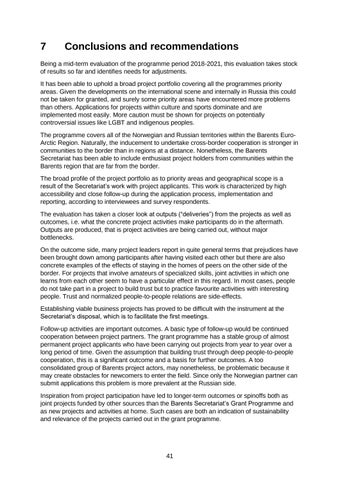7
Conclusions and recommendations
Being a mid-term evaluation of the programme period 2018-2021, this evaluation takes stock of results so far and identifies needs for adjustments. It has been able to uphold a broad project portfolio covering all the programmes priority areas. Given the developments on the international scene and internally in Russia this could not be taken for granted, and surely some priority areas have encountered more problems than others. Applications for projects within culture and sports dominate and are implemented most easily. More caution must be shown for projects on potentially controversial issues like LGBT and indigenous peoples. The programme covers all of the Norwegian and Russian territories within the Barents EuroArctic Region. Naturally, the inducement to undertake cross-border cooperation is stronger in communities to the border than in regions at a distance. Nonetheless, the Barents Secretariat has been able to include enthusiast project holders from communities within the Barents region that are far from the border. The broad profile of the project portfolio as to priority areas and geographical scope is a result of the Secretariat’s work with project applicants. This work is characterized by high accessibility and close follow-up during the application process, implementation and reporting, according to interviewees and survey respondents. The evaluation has taken a closer look at outputs (“deliveries”) from the projects as well as outcomes, i.e. what the concrete project activities make participants do in the aftermath. Outputs are produced, that is project activities are being carried out, without major bottlenecks. On the outcome side, many project leaders report in quite general terms that prejudices have been brought down among participants after having visited each other but there are also concrete examples of the effects of staying in the homes of peers on the other side of the border. For projects that involve amateurs of specialized skills, joint activities in which one learns from each other seem to have a particular effect in this regard. In most cases, people do not take part in a project to build trust but to practice favourite activities with interesting people. Trust and normalized people-to-people relations are side-effects. Establishing viable business projects has proved to be difficult with the instrument at the Secretariat’s disposal, which is to facilitate the first meetings. Follow-up activities are important outcomes. A basic type of follow-up would be continued cooperation between project partners. The grant programme has a stable group of almost permanent project applicants who have been carrying out projects from year to year over a long period of time. Given the assumption that building trust through deep people-to-people cooperation, this is a significant outcome and a basis for further outcomes. A too consolidated group of Barents project actors, may nonetheless, be problematic because it may create obstacles for newcomers to enter the field. Since only the Norwegian partner can submit applications this problem is more prevalent at the Russian side. Inspiration from project participation have led to longer-term outcomes or spinoffs both as joint projects funded by other sources than the Barents Secretariat’s Grant Programme and as new projects and activities at home. Such cases are both an indication of sustainability and relevance of the projects carried out in the grant programme.
41


